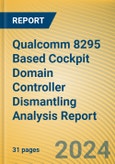The official name of the cockpit domain controller is “Digital Cockpit Head Unit (DHU)”. The cockpit domain controller has two versions, high configuration and low configuration, both of which use Qualcomm SA8295P chips. In terms of cost breakdown, their total cost differs greatly, up to tens of US dollars.
What the publisher dismantled this time is the low configuration version. This article carries out a rough dismantling analysis on the DHU, involving overview, master chip, storage, MCU and radio.
Overview
The DHU looks thick, with three black rectangular blocks, corresponding to a Bluetooth-WiFi system, a Bluetooth-only system, and a radio system.The reason why it is thick is that the DHU adopts the two-layer design of upper and lower PCBs which are connected via B2B. The upper board is responsible for cockpit entertainment and cluster.
As concerns function, the lower board is responsible for providing such functions as camera input, display output, and microphone pickup.
Master Chip and Storage
The core board substrate is mounted on the upper board and is equipped with QAM8295P and 6 main chips, including 4 power management ICs (Qualcomm PMM8295AU) and 2 DRAM chips.In terms of storage, the DHU packs DRAM and NAND chips.
Wherein, the DRAM chip is Micron LPDDR4. The FBGA Code is D9ZRT and the clock frequency is 2133MHz, the lowest specifications in LPDDR4. It is also the lowest-priced automotive grade LPDDR4. As for the high configuration version, the core board memory is 32GB and may be LPDDR4X.
The NAND memory is Samsung's UFS2.1 solution (model: KLUEGAJ1ZD-B0CP), a general-purpose product for mobile phones and automobiles. It features voltage of 1.8/3.3V, resistance to temperatures of -40℃~85℃, and capacity of 256GB. It is deployed outside the core board.
MCU
In the DHU version disassembled this time, the MCU is Renesas R7F7017113, which belongs to Renesas RH850/F1KH series, has 233 pins, and can resist temperatures of -40℃~105℃. The high configuration version of the DHU uses Infineon TC387 as its MCU.Ethernet
The high and low configuration versions vary greatly in terms of Ethernet. Specifically, the high configuration version has an Ethernet switch, while the low configuration version only has an Ethernet physical layer chip. The PCB of the two versions is the same, except that the low configuration version leaves space on the surface of the Ethernet area, not mounted.According to the dismantling, the Ethernet physical layer chip is Marvell 88Q2122. This chip is a 100/1000BASE-T1 Ethernet physical layer transceiver (PHY) defined by IEEE 802.3bw and IEEE 802.3bp, enabling signal transmission on a twisted pair. Using standard digital CMOS technology, combined with all internal active circuits required, it can simultaneously receive and send data on a twisted pair, which is very suitable for multiple automotive applications.
88Q2122 internally integrates the matched termination resistors required for the media-dependent interface (MDI), thereby simplifying the motherboard layout and lowering the motherboard cost as fewer external components are used. Its built-in linear regulator can generate all voltages required. It only needs a 3.3V external power supply to run. Both solutions support 1.8V, 2.5V and 3.3V LVCMOS I/O standards.
The radio chip is deployed on the lower PCB. It can be seen that there are many positions reserved for chips, mainly on account of export.
The radio chip of this domain controller is NXP SAF7750EL, which can correspond to AM/FM in most countries. Yet if the DAB radio is needed, TEF3100 or TEF3200 will need to be added. The main radio chip of the overseas version is generally SAF4000, a fully integrated software-defined radio solution launched by NXP in 2017. SAF4000is compatible with all global broadcast audio standards including AM/FM, DAB+, DRM(+) and HD.
Table of Contents
Companies Mentioned
- Qualcomm







